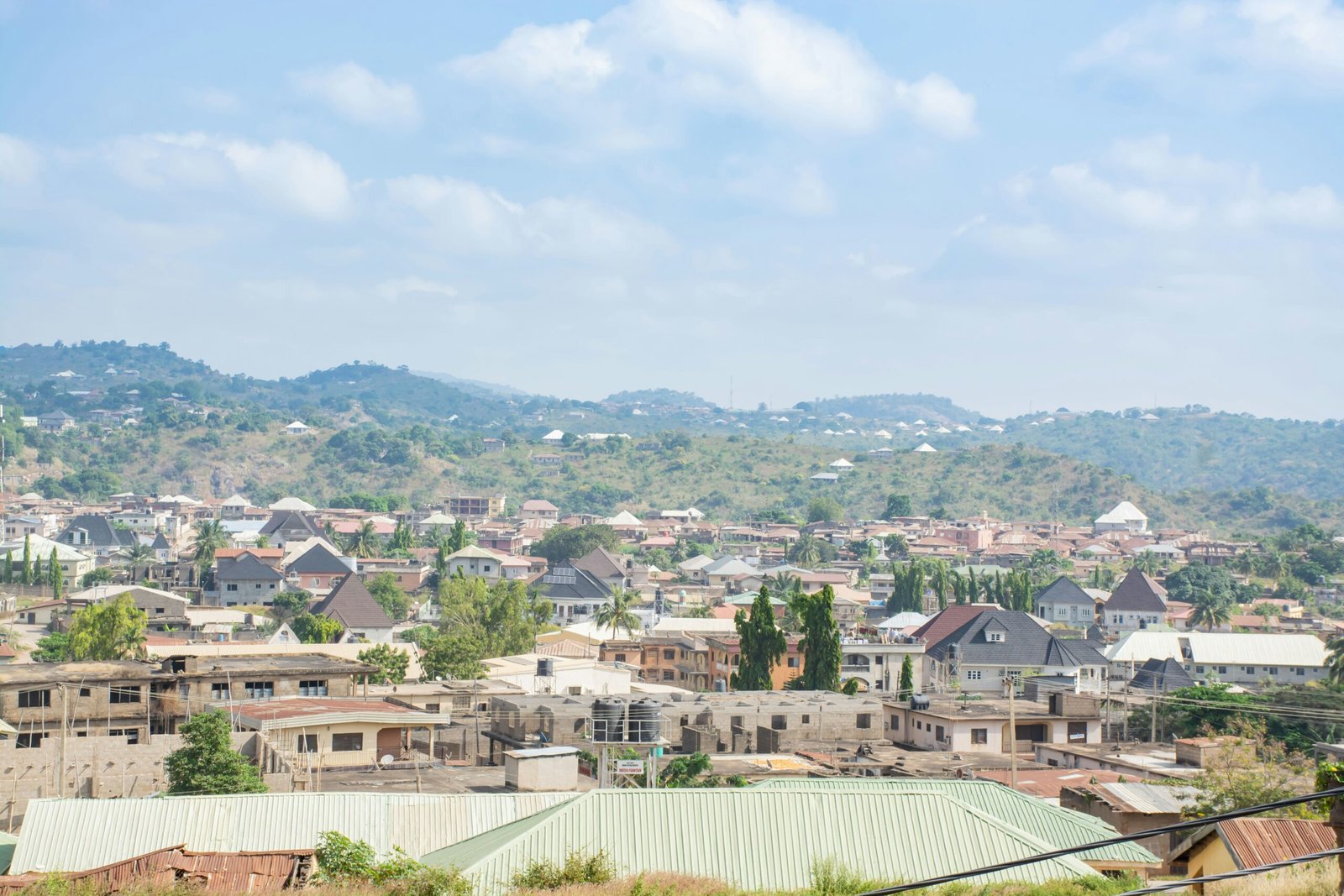“You can make returns in excess of 30% per annum, buy properties with your Mouth, Rent, Rent of Tenants, a year or 2 years Bank interest cost, at 20% to 50% of the real value and do Mortgage without need for down payment in Nigeria with all the risk well mitigated”.
Nigeria is the largest economy in Africa;the secondlargest continent in the world. Our demography andpopulation presenta huge market expedient for viablecommercial activities and consumption which drivebusiness success.
The provision of homes and properties for the large population of ourpeople cum under development gapspresent huge investment opportunities that can generate high returns not available anywhere aroundthe world.
Ownership of property, especially houses, is a very important aspect of the Nigerian tradition. From the perception of many, houses do not only provide shelter, but also serves as a measure of social standing and prestige.Inspite of the high significance attributedto houses and property, it is regrettable to note that only 10% of those who desire home ownership can afford to acquire it either by way of purchase or personal construction as against 72%-USA, 78%-UK, 60%-China, 54%-Korea and 92%-Singapore.
In a recent news report on the Nigerian Housing Sector aired on African Independent Television(AIT), it was stated that between 1973 and 2006, the Federal Housing Authority (FHA) built only30,000 housing units nationwide. According to Mr. Tunde Ipinmosho of the Federal HousingAuthority (FHA), the current housing deficit is about 17 million homes.
If we take into considerationthe currentpopulation of 140 million Nigerians as reported by the National Population Commission after lastcensus exerciseand assume 30 percent of the population as working adults; we have 42million estimated working adults; assuming about 45 percent or 18.9 million of the working adultsqualify for mortgage loans, and assume an average house final selling price at about N2.8million for a 2-bedroom flat, the possible size of the mortgage market is close to N53 trillion.
In real essence, ‘’housing affordability directly or indirectly affects people’s mental health,” Emma said. … Poorer people experience the worst mental health issuesas a result of inadequate or poor housing, Emma mentioned. “If you are already alow-incomeearner and spending too much of that low income on housing, it could affect your mental health.”29 Jul 2019.
Housing all over the world has remained an interdependent phenomenon that affects every facet of mankind. Its importance is so pronounced that it imparts on the social, physical and mental wellbeing of man irrespective of his socio-economic status, color or creed.
It represents one of the most basic human needs and without an iota of skeptism impact on the health, welfare and productivity of theconcerned individual. In spite of the importance of housing to mankind, there is however, a universal shortage of needed dwelling units especially in developing countries including Nigeria where population growth and urbanization are rapidly on the increase and the gap between housing supply and housing demand is so wide andstill inclining.
Sustainable development can be described as that which meets the needs of the present without compromising the ability of future generations to meet their own needs. This definition is a pointer to the fact thatconcerted efforts must be made by the Nigerian government to find ways and means of using the available resources in more sustainable practices in the area of increasing housing stock.
As noted earlier, the country is presently confronted with a relatively large deficit of housing requirementsgrappling with very high occupancy ratio in most citiesplus lack of basic infrastructural facilities such as pipe-borne water, water closet, electricity etc.
The inability to establish efficient, effective and cohesive teams of stakeholders in the real estate sector of the economy into productive unit with enhanced capacity to take advantage of the enormous opportunities in Nigeria has resulted in reduced value propositions that would have been made possible with Collaboration.
The Power of Collaboration
In the real estate sector, everybody is in ‘want’. Those who have land lack the money to develop them into estates, those with money hardly know what to do with these monies as theylack the ideas to put these housing projects together;some leave these monies in banks with returns less than inflation rate between 2% and 5%p.a,some dig the monies in soak away pits or invest in foreign schemes that none of their families is aware of and eventuallylose these monies when they die. Those with ideas to put these real estates together hardly have lands or the monies to pull their dreams through.
You see when God blesses you with something, He expects you to look for one or more other persons he has blessed with what you don’t have. Once you are able to access the other person’s blessings whichfillsthe gap you have, you will get what you are looking for sorted out. A man though blessed as a man will need a woman for a wife, he cannot make children alone. Likewise, a woman if she does not meet a man, she cannot also make children. That is how the blessings of God are and works.
All that is required is collaboration and each individual will get what they lackfor completion.
The Need for Collaboration
The need for strategic collaboration is highly expedient if we want to create decent homes that are affordable and lasting for our populace regardless of the income divide or social class. In view of this, all hands with diverse expertise and strength need to come together to pool through the big challenges and we will have a real time solution for our affordable housing with ease.
The Housing Requirement
The housing requirement is estimated to be in deficit of over 20 million homes. This creates huge investment opportunity in Real Estate development. However, the weak real estate development structures have not been able to bring the various stakeholders in the industry together to economically explore this opportunity.
Consequently, the construction style, Mortgage provision, financing structures, labour and affordability of housing projectsoften present frustrating bottle necks.However, the market is large, demand is huge, technology is available, Cash Rich Individuals and Institutional Investors continue to have returns under inflation rate from both the money and capital markets. You see that with the right collaboration and better understanding of the challenges and the provision of the solution there can be affordable housing in Nigeria.
“The need for strategic collaboration is highly expedient if we want to create decent homes that are affordable and lasting for our populace regardless of the income divide or social class”
Housing Development Challenges in Nigeria
“According to a recent report by Price Waterhouse Coopers (PwC), there is a present deficit of over 17 million houses in Nigeria, and this requires about 700,000 new houses to be built yearly, compared to the less than 100,000 houses that are being constructed yearly. …24 Aug 2020”
Nigeria is no doubt a bride for investors from all around the globe because of heruntapped resources, youthful demography, population and market size but Nigeria like many other developing countries of the world seeminglyposes some challenges to providing housing for his people, despite her huge population and high unmet demand for decent affordable accommodation. Thehousing ecosystem in the country is faced with the following challenges:
- High inflation rate
- High interest rates
- Low per capital income
- Low investment in housing over the years
- Low priority given to housing by successive governments
- Land tenure and ownership
- High population growth and increasing urbanization
- Lack of adequate regulation and legislation for housing
- Building materials and costs
- Lack of acceptability of new construction practices
- Choice of technology
- Resistance in accepting new materials, cheaper and faster building style
- Preference for imported materials which are expensive
- Lack of adequately qualified construction managers and skill artisans
- Lack of adequate and appropriate financial products especiallyfor low income households
Why Housing Investments fail
Type of houses and wrong investment decision
In Nigeria about 70% of the houses offered are luxury houses, 25% town housesandonly 5% are apartments studio;one, or two-bedroom flats. In most civilized environment, it’s the opposite, 70% of their houses are Apartments, 25% town houses and only 5% are real luxury Houses mostly in their country side with lots of these apartments supported by the government provision of what they refer to as‘Council Flats’ and ‘Condoles’.
Meanwhile, the real housing demand is spread in the ratio-70% apartments, 25% town houses and 5% luxury houses. As a result of this, if you go to Nigeria prime city locations, over 50% of the houses there are unoccupied, with a lot of the new developments empty and unsold.
It’s so bad that rich neighborhoods in Abuja like Asokoro and Maitama, 50% of the houses are currently empty, unoccupied, wasting away owing towrong investment decision.If you request to buy one hundred units of 1- or 2-bedroom apartments in Abuja today it is hardly available but you can get as much as 5 thousand duplexes on demand.As you can see, lots of them areempty if you gaze closelyon your way to the airport.They are wrong investment decision as the developers continue to provide houses that the masses cannot afford and Mortgage cannot be used to buyeither.
A larger component of the people constituting about 85% of them live in make shift accommodation in the out skit of the cities without basic amenities.
In synopsis, it is pertinent there is lack of affordable housing schemes for residential and investment purposesin the country.
High Bank Interest cost and Documentary Requirement
The cost of funding is very tasking and high and delay poses serious consequences for real estate project.Banks charge all in cost in excess of 25% per annum and their check list of documentary requirement make approaching them a waste of time. They know Government give developers theRight of Occupancy for lands, but they have on their list of requirements Certificate of Occupancy for lands, Valuation, Off-Takers commitment, collateral to access mortgage and bank loans for housing.
Low Capacity of the Housing Developers
Many developers lie about their capacity to fund projects thus asthey take on these contracts and get stuck because they are not able to execute the jobsequel to lack of wherewithal, resulting in delays that increase the cost of funding. Even when they are paid up-front they divert these funds for short term contract gains or use the funds to secure other projects resulting in a lot of uncompleted and abandoned projects.
Poor Purchasing Power of the Buyers
The home buyers also most times are not able to provide the Equity required to secure the mortgagenecessary to buy the houses. This trend results from poor salaries cum burden of having to pay their rents yearly as against the monthly pay they receiveand this rent most times take out over 40% of their salaries and consequently theystruggle with meeting their obligations, hence the requirement of depositing the equity contribution of10% to 20% becomes impossible toachieve. A civil servant with minimum wage of N30, 000monthly can hardly qualify for mortgage.A home buyer who wants to buy a house of N12 million will require equity contribution of about N3 million as deposit to qualify for mortgage.
Government Regulation
Another problem is the inefficiency in the processing of land registration and building approval, it takes time to get and also increase the cost of developments. Some of these approval processes are phased requiring inspections by regulatory officers to give the go ahead to move on to the next stages. Some of these processes take as long as 6 to 18 months to get the approvals. This create delays that increase the bank and housing cost.
The Cost of Housing
The cost of constructionis negatively influenced by unavailability of irregular power, poor infrastructure, delays in obtaining housing regulatory requirement, disadvantaged exchange rates on imported building materialsand the double-digit interest cost when added to the high overhead cost. All of the aforementionedincrease the cost of construction as the houses offering become too expensive.
Access to Banks by Home Buyers
Most of the Banks are not lending at all and when they decide tolend their requirements are almost impossible to meet by developers and home buyers. Developers are not able to provide the asset required to secure such borrowings.
The high interest rate and stringent conditions placed by banks make access to credit an uphill task for home buyers and investors.
Building Materials
Building materials and components are import dependent and that makes them very expensive in the face of the value of the country’s currency (Naira) and global inflation. With low earning capacity of majority of the country’s citizens, the building materials are rendered out of their reach. It is regrettable to specify that some traditional alternative building materials such as burnt or/and vibrated bricks and roof/ceiling, tiles which are locally produced in the country but found no favor from average Nigerians and as such has not been popularized while their production costs are not competitive enough because of the problem associated with technology and economies of scale.
Housing Finance
In many parts of the world, most especially the developed countries, the sources of housing finance are from government, individual savings, life insurance reserves, commercial banks, savings and loan institutions (Primary Mortgage Institutions or Building Societies). However, in Nigeria, the main sources of housing finance are mainly private enterprises such as Banks, insurance companies, and the Government hardly has intervention funding systems that work.
Housing Laws
In most states in Nigeria, there are many legal restraints that do not promote rapid provision of housing. The country’s land law as represented by the Land Use Act, the preparation of legal documents, and the implications of the country’s proprietary interest as being practiced at the moment differs from our tradition and do not make (deleted)ease of obtaining building approvals. The legal process of perfecting and changing title also faces serious bottlenecks for projects and the banks when the need for recovery arises talking about bank housing loan defaulters.
Building laws and regulations are designed in such ways that they inhibit housing construction in most states of the federation. Legally and economically, the mortgage instruments in operation in the country are still very cumbersome thereby making accessibility to funds by interested borrowers almost impossible. The terms and conditions contained in most of the Mortgages are therefore hardly met.
Unavailability of Mortgage
All governments in Nigeria since independence have highlighted housing as a major priority. Unfortunately for over 60 years of its independence, Nigeria is yet to develop a vibrant mortgage market and houses continue to be provided through the twists and turns of traditional methods of buying land and building over some years, which could be an individual’s entire lifetime. In many cases, such buildings are left uncompleted or individuals have to deplete their entire life savings in order to build a home. The mortgage institution either lacks the funding or is not able to generate the liquidity to see mortgages through. Hence, they impose conditions that are hardly met by home buyers who approach them for a mortgage.
Re-iterating, Government offers land with the Right of occupancy but the demand for a Certificate of Occupancy as a requirement to grant mortgages. Workers whose wages can hardly take care of the monthly obligations are compelled to make equity contributions of 10% to 20%. They are therefore not able to provide the equity contributions as an N12m Bungalow will require them to make an equity contribution of N3m. This is nearly impossible as about 40% of the salaries are used to service the rents.
Nigerian workers are paid monthly and 40% of the salaries are used to service their rents. How will they be able to make the equity requirement for a mortgage?
Just so you know, housing is one of the most basic of human needs. The provision of houses through the creation of mortgages is often taken for granted in developed countries; however, it remains a major challenge in developing countries, especially in sub-Saharan Africa.
It is apparent that our population, huge human, and mineral resources, and good climatic condition is hampered by the above-mentioned challenges. The good news however is that everything we need to succeed is still around us as the un-tapped resources and under development gaps present lots of opportunities for those that are properly positioned with the right exposure, reorientation, mentorship and business development.
Everything we need to succeed is still around us as the untapped resources and under development present lots of opportunities.
“FMG Platform have conceptualized an affordable real estate development scheme for investors / buyers seeking for a viable alternative seamlessly in collaboration with Government, banks, reputable construction companies, Mortgage institutions, private and foreign Financiers.”




